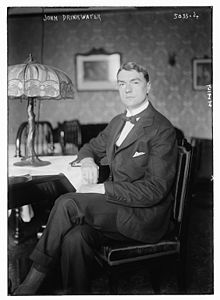fiction.wikisort.org - Writer
John Drinkwater (1 June 1882 – 25 March 1937) was an English poet and dramatist. He was known before World War I as one of the Dymock poets, and his poetry was included in all five volumes of Georgian Poetry (edited by Edward Marsh, 1912-1922). After World War I, he achieved fame as a playwright and became closely associated with Birmingham Repertory Theatre.
John Drinkwater | |
|---|---|
 Drinkwater in 1919 | |
| Born | 1 June 1882 |
| Died | 25 March 1937 (aged 54) |
| Nationality | British |
| Spouse(s) | Cathleen Orford (née Kathleen Walpole) Daisy Kennedy |
| Children | 1 |
Life and career
Drinkwater was born in Leytonstone, Essex (now Greater London), to actor/author Albert Edwin Drinkwater (1851–1923) and Annie Beck (née Brown), and worked as an insurance clerk. In the period immediately before the First World War, he was one of the group of poets associated with the Gloucestershire village of Dymock, along with Rupert Brooke and others.
In 1918 he had his first major success with his play Abraham Lincoln. He followed it with others in a similar vein, including Mary Stuart and Oliver Cromwell. In 1924, his Lincoln play was adapted for a two-reel short film made by Lee de Forest and J. Searle Dawley featuring Frank McGlynn Sr. as Lincoln, and made in de Forest's Phonofilm sound-on-film process.[citation needed]
He had published poetry since The Death of Leander in 1906; the first volume of his Collected Poems was published in 1923. He also compiled anthologies and wrote literary criticism (e.g. Swinburne: an estimate (1913)), and later became manager of Birmingham Repertory Theatre.
He was married to Daisy Kennedy, the ex-wife of Benno Moiseiwitsch, with whom he had a daughter named Penny.
John Drinkwater made recordings in Columbia Records' International Educational Society Lecture series. They include Lecture 10 – a lecture on The Speaking of Verse (four 78rpm sides, Cat no. D 40018-40019), and Lecture 70 John Drinkwater reading his own poems (four 78rpm sides, Cat no. D 40140-40141).[1]
Death and commemoration

Drinkwater died in London in 1937.[2] He is buried at Piddington, Oxfordshire, where he had spent summer holidays as a child.
A road in Leytonstone, formerly a 1960s council estate, is named after Drinkwater, as is a small development of modern houses in Piddington.
Archives
Papers of John Drinkwater are held at the Cadbury Research Library, University of Birmingham.[3] This includes a collection of photographs and photograph albums relating to Drinkwater.[4][5] There are also some Drinkwater papers in the Ashley Library in the British Library.
Notes
- Catalogue of Columbia Records, Up to and including Supplement no. 252 (Columbia Graphophone Company, London, September 1933), pp. 371, 374.
- Frank Northen Magill (1985). Critical Survey of Drama: Authors A-Z. Salem Press. p. 506. ISBN 978-0-89356-377-6.
- "UoB Calmview5: Search results". calmview.bham.ac.uk. Retrieved 28 January 2021.
- "UoB Calmview5: Search results". calmview.bham.ac.uk. Retrieved 10 March 2021.
- "UoB Calmview5: Search results". calmview.bham.ac.uk. Retrieved 10 March 2021.
External links
- John Drinkwater memorial site
- Special Collections and Archives Catalogue University of Gloucestershire Archives and Special Collections
- Works by John Drinkwater at Project Gutenberg
- Works by or about John Drinkwater at Internet Archive
- Works by John Drinkwater at LibriVox (public domain audiobooks)

- Discussion of John Drinkwater's play Abraham Lincoln
- "Archival material relating to John Drinkwater". UK National Archives.
- Archival Material at Leeds University Library
- Plays by John Drinkwater at Great War Theatre
- John Drinkwater Collection. General Collection, Beinecke Rare Book and Manuscript Library, Yale University
На других языках
- [en] John Drinkwater (playwright)
[fr] John Drinkwater
John Drinkwater est un dramaturge et poète anglais né le 1er juin 1882 à Leytonstone (Londres) et mort le 25 mars 1937 à Londres.Другой контент может иметь иную лицензию. Перед использованием материалов сайта WikiSort.org внимательно изучите правила лицензирования конкретных элементов наполнения сайта.
WikiSort.org - проект по пересортировке и дополнению контента Википедии